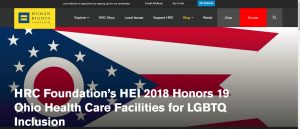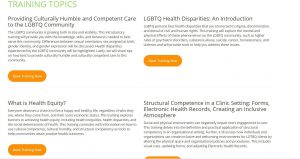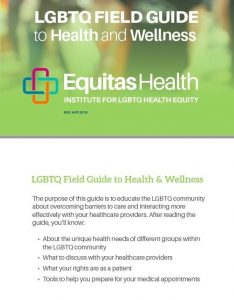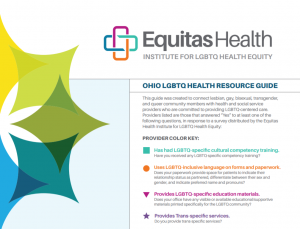Main Body
Cultural Humility and LGBTQ Communities in the Healthcare Environment
Julia Applegate
Introduction
Over 10 million people in the United States over the age of 18 identify as LGBTQ (Gates, 2017). Due to systematic inequities, disparities, and injustices, the LGBTQ community is disproportionately affected by physical and mental health illnesses, are less likely to have health insurance, and experience worse health outcomes compared to the general population. Despite being a population with pronounced healthcare needs, LGBTQ individuals face a lack of culturally humble and structurally competent providers, which further increases their obstacles to accessing and securing safe and high-quality health care.
Equitas Health is a health care delivery system with 17 offices in 11 cities serving 67,000 individuals on an annual basis across the state of Ohio. With nearly 400 employees, Equitas Health employs nurses, social workers, physicians, pharmacists, HIV prevention specialists, and a wide range of other staff devoted to taking care of the LGBTQ Community, People Living with HIV (PLWH) and anyone looking for a medical home. The organization also provides education and training for health and social service providers, and for community members, who identify as LGBTQ. These services are provided through the Equitas Health Institute for LGBTQ Health Equity. In the two years since the formation of the Institute, over 5,700 providers in settings as diverse as a children’s hospital, an adolescent inpatient psychiatric facility, a home health agency, countless college classes, and a veterinary clinic have been conducted in an effort to decrease the many health disparities experienced by LGBTQ community members.
This chapter explores in depth the tactics deployed by Equitas Health and the Institute for LGBTQ Health Equity to activate its mission of providing ‘Care to All’ in the most culturally humble and inclusive manner for serving LGBTQ communities.
A Case Study on Leadership Best Practices for Serving the LGBTQ Population
Health Disparities in the LGBTQ Community
Among the health disparities experienced by the LGBTQ community, LGBTQ people experience a disproportionate amount of suicide, homelessness, mental health challenges, breast and cervical cancer, HIV and other STIs, as well as obesity, tobacco, alcohol and other substance abuse. The transgender community is at even greater risk for many of these concerns than their lesbian, gay and bisexual counterparts. While some of these health disparities are a result of behavior, the vast majority of them are associated with social and structural inequities resulting from institutionalized homophobia, transphobia, stigma and discrimination levied against LGBTQ people. The health disparities experienced by LGBT people can be grouped into four basic categories; (Healthypeople.gov, 2010)
1. Infectious Disease
2. Chronic Disease
3. Behavioral Health
4. Quality of Life Issues
The LGBTQ community is less likely to regularly seek medical care and more likely to be uninsured or underinsured. A major barrier to seeking medical care for members of the LGBTQ community is prior discrimination. According to a Lambda Legal report in 2010, 56% of LGB people and 70% of TGNC individuals report at least one experience of the following; being refused care, health care professionals refusing to touch the patient or using excessive precautions, health care professionals using harsh or abusive language, being blamed for their health status, and health care professionals being physically rough or abusive.
Additionally, education regarding culturally humble treatment of LGBTQ patients is absent or near absent from professional training across most health-related disciplines. Treating patients/clients with cultural humility in the case of LGBTQ community members includes respecting patient pronoun usage, asking demographic questions that include sexual orientation and gender identity options, making waiting rooms LGBTQ friendly, etc. Cultural humility is a lifelong process and commitment to self-evaluation, self-critique, learning, reflection, and working in partnership with those belonging to a different culture. It is evident that in order to reduce health disparities in the LGBTQ community, attention must be paid to both provider and patient education, provider-patients interactions, and organizational structures, processes, policies and practices. Thus, strong leadership from health care organizations, health care education entities and community-based organizations is critical in order to achieve health equity for this historically marginalized community.
Role of Cultural Humility Training for Students and Providers
Cultural humility not only requires a lifelong commitment, but also requires that we recognize and address power dynamics in any provider-patient/client relationship. To improve the overall safety and quality of care, organizations should aspire to meet the unique needs of their patients – patient by patient. Addressing patients and clients from a place of cultural humility increases overall engagement and retention in care, resulting in better health outcomes. Cultural humility is an important tool for tackling issues of health disparities and health inequities in the LGBTQ community. Serving the LGBTQ community effectively requires the delivery of culturally humble care and services. Because this underserved population is often misunderstood, it is important to begin efforts to close the gaps in care by implementing a curriculum designed to increase the cultural competency and cultural humility of health care providers serving the LGBTQ community. Implementation of these kinds of trainings for providers and medical students has been shown to improve access to and quality of care for LGBTQ patients thus contributing to a reduction in health disparities.
Structural Competency: From the Waiting Room to the Patient Room
Another recent approach to improving health care experiences for LGBTQ populations as a supplement to cultural humility training is the concept of structural competency (A. Donald, 2016). Structural competency is an innovative approach to be adopted when training health care providers, particularly in medical school settings, to take care of LGBTQ individuals. Rather than relying solely upon teaching students to consider the unique needs of LGBTQ communities as a function of cultural difference, the structural competency approach requires providers to consider systemic factors that contribute to disparate health outcomes. Recognition that structural factors such as discriminatory public policies, codified practices that stigmatize LGBTQ identities, implicit bias, etc. contribute to disparate health outcomes will enable health care providers to increase their ability to provider culturally and structurally competent care to the LGBTQ population.
Structural competency requires the implementation of practical steps for indicating the ability to appropriately serve LGBTQ individuals. Examples of these practices include incorporation of LGBTQ specific support groups, inclusion of pronouns on patient intake forms, display of posters, magazines, stickers and other physical markers of LGBTQ inclusion, application of trauma informed care practices, and the provision of ‘all gender’ restroom facilities in healthcare settings.
Equitas Health: Best Practices Case Study Deployed
Equitas Health employs nurses, social workers, physicians, pharmacists, HIV prevention specialists, case managers and a wide range of other administrative staff devoted to taking care of the LGBTQ community, People Living With HIV (PLWH) and anyone looking for a welcoming healthcare home. Serving 67,000 individuals on an annual basis, Equitas Health is committed to providing all of it services with a culture of humility and commitment to inclusivity.
This commitment to LGBTQ Cultural Humility is evident in a number of ways and can be seen in three areas including; (1) provider-patient relations, (2) patient education and empowerment efforts, and in (3) larger organizational policy and employment practices. A study of these three aspects illustrates the implementation of best practices for serving LGBTQ communities with cultural humility. Each of the three areas deployed by Equitas Health are explored in the rest of this chapter.
(1) Provider-Patient Relations
Patient-provider relations are an important part of the health care experience for LGBTQ community members. The ability to seek care from providers who are known to be culturally humble to the unique needs of the LGBTQ community addresses one of the primary barriers to care for this population. There are many ways patients are able to assess the cultural humility of providers in Equitas Health clinical settings.
HEI Designation
The Human Rights Campaign is the largest policy and advocacy organization devoted to the equal treatment of the LGBTQ community in the United States. Each year they publish The Healthcare Equality Index Report devoted to the evaluation of health care providers nationwide. Participating providers complete an evaluation to measure their degree of cultural competency for serving LGBTQ community members. Facilities who score well on the survey earn the coveted designation as a “Healthcare Equality Leader.” This designation signifies that awardees provide LGBTQ inclusive care.
Equitas Health has received the designation of Healthcare Equality Leader for the past four years and displays this designation proudly in clinic spaces and on relevant patient materials. In order to receive the designation, Equitas Health had to verify its compliance with the four core criteria of the evaluation. The four core criteria evaluated are:
1. Non-discrimination and Staff Training
2. Patient Services and Support
3. Employee Benefits and Policies
4. Patient and Community Engagement
Patient-provider relations are best reflected in the Patient Services and Support measure. Equitas Health received high scores in all areas of Patient Services and Support (LGBTQ patient services and support, Transgender patient services and support, patient self-identification and medical decision making). In 2018, Equitas Health was one of only 19 health care facilities in Ohio to receive the HEI Leader Designation.

WPATH Certification
WPATH is the World Professional Association for Transgender Health. It is a globally respected professional organization dedicated to transgender health. WPATH publishes the Standards of Care for the Health of Transsexual, Transgender, and Gender Nonconforming People. These guidelines assist physicians, surgeons, nurses, psychiatrists, counselors, and others in the treatment of gender dysphoria. WPATH also operates an education initiative designed to certify health providers in delivery of culturally humble, medically appropriate care for transgender, transsexual and gender non-conforming (TGNC) individuals. WPATH Certification ensures transgender patients that their care provider is skilled in the core competencies required for delivery of culturally humble transgender health care.
As a demonstrable commitment to the provision of culturally humble care, several staff members at Equitas Health have untaken WPATH training. These providers include the Chief Medical Officer Chad Braun, Physician Kelly Seifert, Nurse Practitioners Mimi Rivard and Jessica Sherman, and Psychiatric Nurse Practitioner, Justin Kerr. Presently one staff physician, Dr. Kelly Seifert, has completed WPATH certification and sees a large transgender, non-binary and gender non-conforming patient panel. This certification is not required to care for TGNC patients, however, WPATH is a globally recognized authority on TGNC health and as such, supporting providers in their pursuit of WPATH certification demonstrates Equitas Health’s deep commitment to TGNC specific cultural humility.
Patient self-identification
Sexual orientation and gender identity (SOGI) data is not routinely collected in most health care settings. The perception that asking these questions will be considered rude or invasive is often cited as justification for not collecting this data (Cahill, 2014). However, the ability of LGBTQ patients to self-identify is a critical component of providing culturally humble healthcare experiences. All patient intake forms used in clinical and case management settings at Equitas Health include specific questions about sexual orientation and gender identity. Further, these questions are written in an inclusive and expansive manner, designed not just to ask about SOGI, but to do so in the most expansive ways possible. For example, questions about gender identity allow patients to identify as male, female, transgender, genderqueer, gender non-conforming, non-binary, and as ‘something else,’ with a space given for patients to write-in the term with which they most closely identify. Additionally, patients are asked to share their pronouns and preferred name with providers. Because legal name and preferred name frequently do not align for transgender patients, it is critical to make space for this important information to be shared. Providers also routinely introduce themselves with the pronouns they use when meeting with clients. Routinizing this behavior ensures clients will have an opportunity to refresh providers with the current pronoun they use at each visit-an important element of culturally humble care for patients who are exploring their gender identity.
LGBTQ Cultural Humility Training
As discussed above, cultural competency and humility training is an important mechanism for increasing the likelihood that providers treat LGBTQ patients in the most culturally appropriate manner. As an important demonstration of its commitment to cultural humility all Equitas Health staff are required to complete at least one LGBTQ cultural humility training. Training is provided by staff of the Institute for LGBTQ Health Equity. These trainings are designed according to best practices for teaching LGBTQ cultural humility, are certified for continuing education credits in nursing, social work, psychology and other disciplines as required, and are regularly evaluated for effectiveness.
The Institute maintains a large curriculum which is described in detail by the Education and Training Brochure and an example of the training curriculum developed by the Institute follows:

(2) Patient Education and Empowerment Efforts
A significant obstacle preventing consistent linkage to health care reported by sexual and gender minorities is discrimination and disrespect from providers. The need to enhance patient-provider interactions has been highlighted repeatedly by many research studies. However, most studies’ recommendations approach the issue from the provider perspective, arguing in favor of efforts to improve the cultural competency/humility of healthcare providers. Few studies argue for the empowerment of patients directly despite volumes of research documenting the benefits of patient empowerment on the outcomes of chronic illnesses.
In an effort to empower patients to take control of their healthcare experiences, Equitas Health has developed several important tools to increase patient levels of confidence when seeking medical care. Those tools are described below:
Patient Empowerment Workshops
Over the course of a two-year period, The Equitas Health Institute for LGBTQ Health Equity conducted workshops exploring multiple methods of patient empowerment with LGBTQ patients. These workshops include modules on mindfulness/emotional regulation, knowing one’s legal rights as a patient and the use of assertive communication techniques. Preliminary data collection has demonstrated the effectiveness of the Patient Empowerment Workshops in improving community member’s sense of participation, knowledge, and self-efficacy. Patient Empowerment Workshops are conducted on a quarterly basis in the two Columbus medical clinic settings.
Field Guide to LGBTQ Health
As an accompaniment to the Patient Empowerment Workshops the Institute has developed the LGBTQ Field Guides Health and Wellness. The purpose of this guide is to educate the LGBTQ community about overcoming barriers to care and interacting more effectively with their healthcare providers. The guide provides insight into the unique health needs of different groups within the LGBTQ community, tips on what to discuss with healthcare providers, information about patient rights and tools to help patients prepare for medical appointments.

LGBTQ Healthcare Provider Guide
Another tool created to increase patient empowerment is the LGBTQ Health Provider Guide. This is a resource to connect LGBTQ community members with health and social service providers who are committed to providing LGBTQ centered care. Providers who are listed in the directory must pledge to comply with at least one of four measures that contribute to making healthcare experiences inclusive for LGBTQ individuals. This guide is distributed widely across the state of Ohio and is available on the Equitas Health Institute webpage.

http://www.equitashealthinstitute.com/wp-content/uploads/2018/02/ProviderDirectory-fullpage.pdf
(3) Organizational Policy and Employment Practices
Providing culturally humble care and services to patients is the cornerstone of LGBTQ cultural humility, however, it is also essential to ensure the organization has internal policies and procedures that protect and empower its LGBTQ employees. There are numerous strategies employed by Equitas Health to do just that. A discussion of those strategies follows:
Employment Non-Discrimination Policies
In the absence of federal protections against employment discrimination based on sexual orientation and gender identity, LGBTQ employees cannot expect to be protected from being fired for their perceived or expressed sexual orientation or gender identity. This type of protection is found only in places of employment or municipalities that adopt specific legislation or employment practices that extend protections to LGBTQ employees. Equitas Health has explicit non-discrimination clauses in its patient and employer policies that prohibit discrimination based on all of the federally protected classes, as well as sexual orientation and gender identity. This provides and additional layer of comfort for LGBTQ employees.
Hiring Practices
As a caretaker of the LGBTQ community, Equitas Health finds value in the employment of LGBTQ community members. As such, explicit attention is given to the recruitment and retention of LGBTQ employees. The organization has a newly formed Employee Resource Group for lesbian employees and is in the process of developing a similar group for trans and gender non-conforming employees. Supporting staff with affinity groups is an additional measure to create a supportive work environment for LGBTQ employees.
Trans Inclusive Health Insurance
Few employer health insurance plans provide comprehensive insurance policies to meet the need of transgender employees. In the aftermath of the Affordable Care Act it is more common to see health insurance plans provide coverage for hormone replacement therapy for individuals who identify as transgender, but few cover surgical intervention and other therapies that may help alleviate the impact of a gender dysphoria diagnosis (speech therapy, tracheal shave, vaginoplasty, orchiectomy, metoidioplasty, etc.). Equitas Health has a partially trans inclusive health insurance policy for all full-time staff and is working toward a fully inclusive policy in the near future.
Solidarity Tool Kit
Finally, in an effort to employ structural competency practices with their own employees, Equitas Health has created a Solidarity Tool Kit to help staff convey their cultural humility to the patients and community we serve. All staff are provided with a tool kit that contains pronoun buttons, stickers, a lanyard pull and a lapel pin that utilize LGBTQ pride symbols. The use of the rainbow and the colors in the transgender pride flag serve as a visual indicator of employee commitment to serving the community with humility.

Conclusion
In April of 2016, the AIDS Resource Center of Ohio rebranded as Equitas Health. The change in name reflected a mission change from a focus on HIV case management, prevention and treatment, to a broad-based LGBTQ Patient Centered Medical Home (PCMH) health care delivery model. During this time, Equitas Health has shown significant leadership in the implementation of best practices for serving LGBTQ communities with a focus on cultural humility. One data point that drives home the success in this area is the increase in the transgender patient panel cared for by Equitas Health physicians and nurse practitioners.
In January of 2016, Equitas Health served 35 transgender patients with HIV care services. By January of 2018, 583 transgender patients sought medical care at Equitas Health clinics, a massive increase in patients served and a positive indication of the degree of cultural humility and structural competency conveyed by the providers. The emphasis on a culturally humble healthcare delivery model ultimately seeks to result in a reduction of healthcare disparities for this vulnerable population. If the first two years of implementation are any indication, Equitas Health is one its way toward making a dent in these disparities.
Appendix
Equitas Health patient intake form:
| Legal Name* Last First Middle Initial Preferred name: | ||
| Legal Sex (please check one)* Female Male | Pronouns: | |
| *While Equitas Health affirms the range of sexual orientation, gender identity and gender expression, many insurance companies and legal entities unfortunately do not. Please be aware that the name and sex you have listed on your insurance must be used on documents pertaining to insurance, billing and correspondence. If your name and pronouns you use are different from these, please let us know so that we may address you as you wish. | ||
| Date of Birth Month Day Year / / / | Social Security # | State ID # or License # |
This information is for demographic and care purposes:
| 1.) What is your annual income? | 2.) Employment Status | 3.) Racial Group(s) (check all that apply) | 4.) Ethnicity: |
| – Employed full time | – African American / Black | – Hispanic/Latino/Latina | |
| – Employed part time | – Asian | – Cuban | |
| – No income | – Student full time | – Caucasian / White | – Puerto Rican |
| – Student part time | – Native American / Alaskan Native / Inuit | – Mexican | |
| – Retired | – Pacific Islander | – Other | |
| 1a.) How many people (including you) does your income support? | – Unemployed | – Other | |
| – Other | 5) Country of Birth | ||
| – USA | |||
| – Other |
| 6.) Preferred Language (choose one:) | 7.) Do you think of yourself as: | 8.) Relationship Status | 10.) Referral Source |
| – English | – Lesbian, gay, or | – Married | – Self |
| – Español | homosexual | – Partnered | – Friend or Family Member |
| – Français | – Straight or heterosexual | – Single | – Health Provider |
| – African (Specify:____________) | – Bisexual | – Divorced | – Emergency Room |
| – 中文 | – Something else | – Other | – Ad/Internet/Media/ Outreach Worker/School |
| – Other | – Don’t know | – Other | |
| – I need an interpreter | 9.) Veteran Status | ||
| – Veteran | |||
| – Not a Veteran |
| 11.) What is your gender identity? | 12.) What was your assigned sex at birth? | 13.) Do you identify as transgender? | |
| – Female | – Female | – Yes | Please turn over |
| – Male | – Male | – No | |
| – Genderqueer | – Intersex | – Don’t know | |
| – Non-binary | |||
| – Something else | |||
